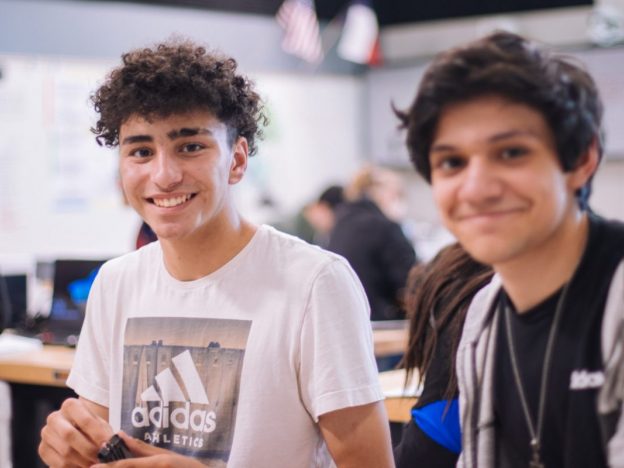Building friendships is an essential part of growing up, especially for tweens and teens, as their friends often feel like the very centre of their world. But along with all the fun and laughter, there can also be (sometimes explosive!) fallouts and drama.
It can be hard to watch your child struggle with the ups and downs of friendships, and you may find yourself wondering whether you should step in to fix things or take a step back and let them handle it on their own.
The truth is, friendship drama is a normal (and often necessary) part of development. These experiences help young people develop empathy, effective communication, and emotional regulation skills. But they still need your support and guidance to navigate these challenges.
So, how can you recognise when your child is struggling — and support them without taking over?
The Ups and Downs of Friendship
Conflict, misunderstandings, and shifting loyalties are a natural part of growing up (even among adult friends). It’s through these experiences that your child learns key social skills such as empathy, boundary setting, negotiation, and cooperation.
While friendship drama can feel difficult (for both your child and you), it doesn’t necessarily mean a friendship is unhealthy.
These ups and downs become more pronounced during the tween and teen years due to the developmental changes your child is experiencing. This is a time when young people are figuring out who they are and where they belong in the world outside their family. When you mix that with the emotional intensity of adolescence, it’s no wonder friendship drama happens!
How to Recognise When Your Teen Is Struggling
Friendship wobbles are a normal part of growing up, but sometimes your child may be struggling more than usual. Signs to look out for include:
- Noticeable changes in mood
- Reluctance to go to school
- Withdrawal from friends or social activities
- Over-dependence on one particular friend
- Anxiety about group dynamics
- Increased stress linked to screen time, group chats, or social media interactions
Friendship Challenges for Neurodivergent Kids
For children with ADHD or who are autistic, friendships can sometimes feel even more challenging. It can be tricky to read social cues or keep up with ever-changing group dynamics, and this can make fallouts feel especially intense.
The good news is that the same core strategies of listening, validating feelings, and teaching coping skills, are equally effective for neurodivergent children. They may just need a little more patience, practice, and encouragement along the way.
How to Support Your Teen (Without Taking Over)
Start by really listening to what your teen has to say. Take a curious approach — the goal is to understand their perspective, not to rush in and fix things. This can be tough, especially when your instinct as a parent is to protect them, but that’s not always what your teen needs.
Validate their feelings first. Saying something like “That sounds really tough” can help them feel seen and heard. From there, you can ask open-ended questions such as:
- “What do you think might help next time?”
- “How do you want to handle this?”
These kinds of questions help them reflect and problem-solve, with you by their side rather than in the driver’s seat.
Teaching Healthy Coping Skills
The most effective way to teach coping skills is to model positive relationships at home. Be open about emotions and demonstrate empathy and respect when working through disagreements.
Encourage your teen to widen their social circle through clubs, sports, or activities outside school. For younger tweens, role-playing social situations can also help build confidence and communication skills.
When (and How) to Step In
Sometimes adult involvement is necessary — especially in cases of bullying, ongoing exclusion, or emotional harm.
If that happens, try to work collaboratively with the school and your child rather than immediately stepping in to “rescue.” Talk things through together and help your teen identify what small steps they can take first.
Helping Them Build Confidence and Coping Skills
You can help your child by:
- Encouraging them to see things from another person’s perspective
- Supporting them to handle disappointment and mend friendships
- Reminding them that friendships can change - that’s a natural part of growing up
These skills help them build resilience and confidence that will serve them well into adulthood.
Looking After Yourself
When your child is facing friendship challenges, it can bring up your own memories or anxieties — especially if you struggled with similar experiences. Remember that your feelings are valid, but they aren’t necessarily the same as your child’s.
The best way to support your teen calmly is to look after yourself, too. You might do this by talking things through with another adult or doing anything that helps you recharge.
Final Thoughts
Friendship drama can be challenging, but it’s often temporary and is a valuable part of growing up. By positioning yourself as a guide rather than a fixer, you help your tween or teen build empathy and confidence in their ability to build positive, healthy relationships.
If you’re finding these situations bring up difficult feelings or worries, counselling can offer a safe, supportive space to help you feel more confident in how you support your child.
If you’d like to explore how I can help, you can get in touch here or find out more about my work with parents of tweens and teens HERE.

